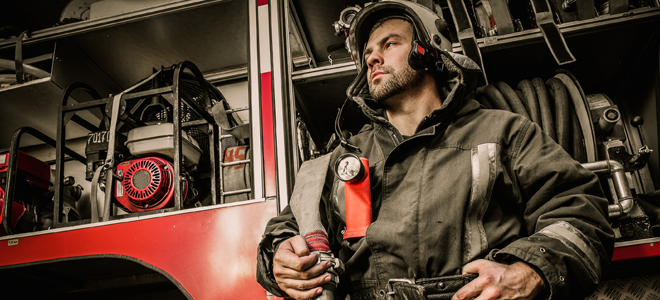
Firefighters are often the saviors of the community. Not only do they help get fluffy out of the tree – they will usually be the first to your rescue if you are in an accident or if your house is on fire. In order to be a firefighter, you have to be strong and stocky and you must have a neck that can hold a multiple pound fire hose, fire victims or an enormous cat. The only problem with this is that a stocky frame and big neck is usually a recipe for sleep apnea. Now, a new study shows that many firefighters actually do suffer from undiagnosed sleep disorders.
The study, which was recently released, took a look at over 7000 firefighters from 66 departments across the United States. Researchers from the Brigham and Women’s Hospital in Boston (specifically the Division of Sleep and Circadian Disorders department) screened the firefighters for sleep apnea and a number of other sleep disorders. The firefighters were also asked about their likelihood of falling asleep at the wheel, involvement in accidents, close calls or any other injuries that they may have suffered on the job.
The results were not that surprising: 37% of the 7000 participants suffered from sleep disorders such as obstructive sleep apnea. That’s over 2,500 firefighters out of a small test sample. Moreover, the researchers found that these individuals also has a much higher likelihood of falling asleep at the wheel or have actually been in an auto collision. That means that these firefighters have had close calls while behind the wheel of a large fire truck, which could put many people in danger. In addition, these firefighters also had a higher probability of suffering from heart disease, diabetes, and depression.
The study, which was published in the Journal Of Clinical Sleep Medicine, also revealed that about 80% of those firefighters suffering from sleep disorders were undiagnosed. This means that a majority of these firefighters had no idea that they were even suffering in the first place, which paints an incredibly dark picture for a wider population. Chief of Brigham and Women’s Division of Sleep and Circadian Disorders, Dr. Charles Czeisler, suggests that occupational sleep apnea screening programs can greatly help firefighters – and people in other careers – get to the bottom of their sleep apnea.
When it comes down to it, if you are a firefighter – or if you suspect that you have obstructive sleep apnea – you don’t have to wait to find out if you are suffering from the sleep disorder. In fact, you can get yourself tested with a home sleep test. The truth is that home sleep tests are much more convenient and they offer much more accurate results. At the end of the day, if you have a job that requires you to save the day, it is important to first save yourself and get to the bottom of your sleep disorder – relief may be just around the corner with CPAP treatment.









